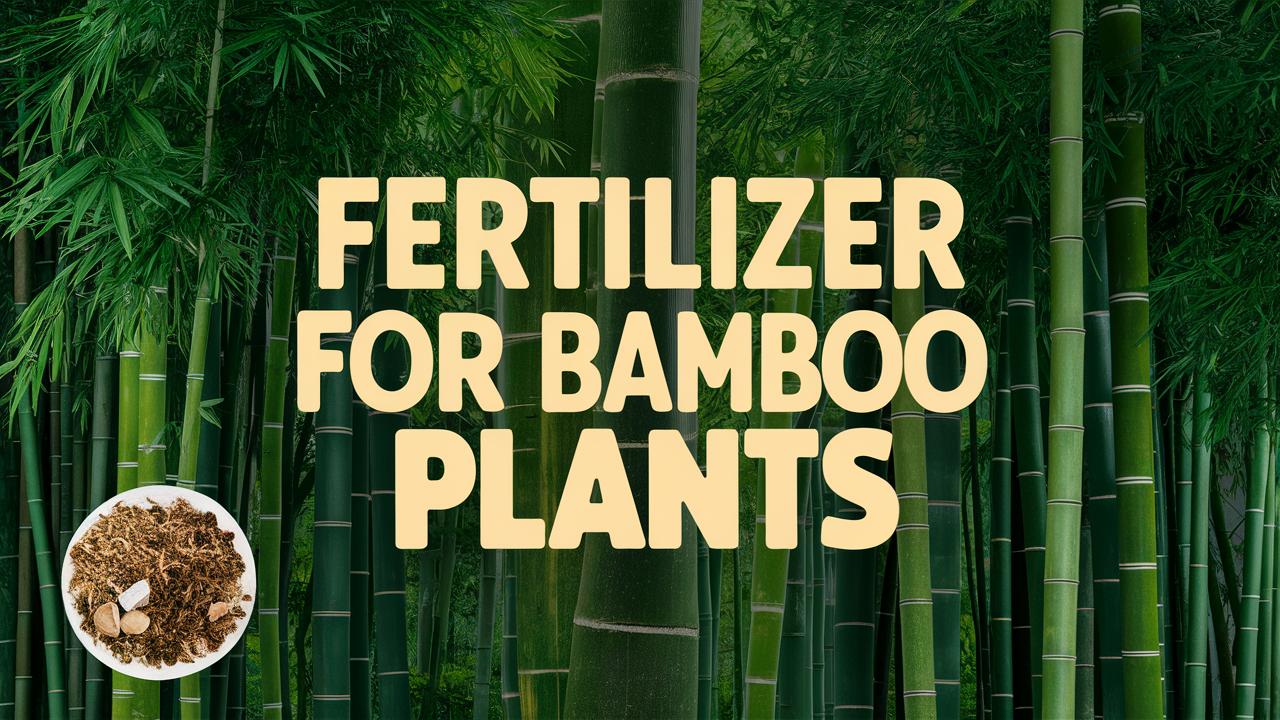In this comprehensive guide, we’ll explore how to choose a fertilizer for bamboo plants, leading you through the various aspects to consider:.
Fertilizer For Bamboo Plants
| Image | Name | Rating | Shop |
|---|---|---|---|
 | Bamboo Fertilizer |  | |
 | Biochar Fertilizer |  | |
 | Bonsai Fertilizer |  |
Bamboo Fertilizer
This product, Bamboo Special 12 Month Control Release 13-5-11 High Nitrogen Fertilizer – 2 Pound Package, is a high-quality fertilizer that’s specifically designed to meet the needs of fast-growing bamboo plants.
With its professional strength and durable 12-month controlled release formula, this fertilizer will provide your bamboo plants with steady nutrition over an entire year with just one application. Perfect for both clumping and running bamboo species, this formula is high in nitrogen to promote healthy growth and maintain vibrant green foliage on even the most aggressive growing privacy hedges. The ease of use and potent impact make it a great choice for serious bamboo enthusiasts or commercial growers who demand only the best from their plants.
Biochar Fertilizer
The Lewis Bamboo – Biochar Fertilizer 18-5-12 (10 LB Bag) – Time Release Fertilizer with Charcoal is a great option for feeding your bamboo plants. This product features a unique blend of time release fertilizer and biochar, which helps retain moisture in the soil.
The added benefit of this fertilizer is its ability to provide nitrogen, promoting lush and healthy foliage growth. It’s recommended to fertilize with this product twice a year – once in early spring to encourage new growth and again during the middle of the growing season to replenish depleted nutrients. With its 10-pound bag size, you’ll have enough to feed your bamboo plants for some time.
Bonsai Fertilizer
Looking for a reliable fertilizer for your bamboo plants? Consider the Professional Liquid Lucky Bamboo Fertilizer, a 3-1-2 concentrate specifically designed for flowering plants like Lucky Bamboo. This multi-purpose blend provides all the necessary nutrients for healthy growth.
This liquid concentrate is easy to use – simply mix it with water according to the instructions (1-2 tsp per 8 cups of water), and apply it every other watering cycle. It’s a great choice for seedlings, mature plants, and works just as well for various bonsai varieties. What’s more, this fertilizer comes with durable packaging and is guaranteed by the manufacturer, so you can rest assured that your plant will thrive!
Pro Green 24 Fertilizer Concentrate
This product, Bamboo Liquid Fertilizer HighTech NPK for bamboos and Grasses, Root/foliar – Professional Plant Food, has been designed to provide a nutrient-rich formula specifically tailored for bamboo and grass plants.
We recommend this fertilizer as it belongs to the latest generation of fertilizers that helps promote healthy and bright green leaves, stable branches, strong bud formation, and balanced rooting. The product can be administered via roots or used as a foliar fertilizer, offering rapid effects. It comes in an economical 250ml concentrate format with simple dosage instructions through the cap.
Gardenera Organic Superfood Concentrate
If you’re looking for a fertilizer to promote healthy growth in your bamboo plants, consider using Plant Growth Superfood for Bamboo. This organic plant food fertilizer contains 18 essential vitamins and minerals derived from natural sources like poultry litter, rabbit manure, and worm castings.
The formula is designed to provide a balanced nutrient supplement that supports root growth, leaf development, and overall plant health. As an added bonus, this fertilizer is long-lasting, doesn’t expire in any form, and instantly dissolves in water without leaving behind any harsh chemicals or odors. This makes it suitable for indoor houseplants as well as outdoor gardens, offering a simple solution to enhance the growth of your bamboo plants.
Green Green Plant Food Lucky Bamboo Fertilizer
If you’re looking for a reliable fertilizer to promote healthy growth in your lucky bamboo plant, we’d recommend checking out the Green Green Plant Food Lucky Bamboo Fertilizer. This product comes in two 36ml bottles, which should provide enough nutrient-rich food for your bamboo plant to thrive.
The reason we suggest this particular product is because of its straightforward packaging and compact size, making it easy to store and use as needed. Although there’s no detailed description provided for the product, the name itself implies that it’s been formulated with lucky bamboo in mind – which suggests it contains a balanced mix of essential nutrients your plant will love.
How To Choose a Fertilizer For Bamboo Plants
Bamboo is often celebrated for its rapid growth and its versatility in landscaping. As gardeners, we’re drawn to it because of its unique stature and ecological benefits. However, selecting the right fertilizer for bamboo can be a nuanced task. Understanding the nutritional needs of bamboo and the types of fertilizers available will ensure that your bamboo thrives. In this comprehensive guide, we’ll explore how to choose a fertilizer for bamboo plants, leading you through the various aspects to consider: the nutritional requirements of bamboo, types of fertilizers, application techniques, and special considerations when fertilizing bamboo.
Understanding Bamboo’s Nutritional Needs
Before diving into fertilizer options, it’s essential to grasp what bamboo plants require nutritionally. Bamboo, like all plants, undergoes the process of photosynthesis, which is crucial for its growth and health. However, to support its often incredible growth rates, bamboo has specific needs, particularly for nitrogen, phosphorus, and potassium—commonly referred to as the N-P-K ratio.
Nitrogen (N)
Bamboo is a grass and is classified as a heavy feeder, meaning it thrives on ample amounts of nitrogen. Nitrogen promotes robust green foliage and supports the overall growth of the plant. Bamboo needs nitrogen especially during the growing season, which for many species can last from spring to early fall. A nitrogen deficiency may present as yellowing leaves or stunted growth.
Phosphorus (P)
Phosphorus plays a crucial role in root development, flower formation, and overall energy transfer within the plant. While bamboo isn’t known for its flowering, a healthy root system is vital for sustained growth and resilience. A balanced amount of phosphorus will foster stronger roots, helping bamboo establish firmly in the soil.
Potassium (K)
Potassium is key to numerous biological functions in plants, including water regulation and stress resistance. For bamboo, potassium helps increase the plant’s ability to withstand drought and fight off diseases. A potassium-rich fertilizer boosts resilience, especially in young and newly transplanted bamboo plants.
Micronutrients
In addition to the primary nutrients, bamboo also benefits from micronutrients such as magnesium, calcium, and iron. These elements can help in chlorophyll production, enhancing overall leaf health and vigor.
Types of Fertilizers Available
Understanding the different types of fertilizers available is crucial in selecting the right one for bamboo. The main categories of fertilizers include organic, synthetic, liquid, and slow-release options. Each of these has unique attributes which can influence your choice based on your specific bamboo plants and personal gardening practices.
Organic Fertilizers
Organic fertilizers are derived from natural sources, including plant and animal matter. Compost, manure, and bone meal all fall under this category. Organic fertilizers release nutrients slowly, improving soil structure and microbial activity over time. For bamboo, using a balanced organic fertilizer can provide ample nutrients while also enhancing the surrounding soil ecosystem.
Benefits of Organic Fertilizers:
Soil Health: They promote microbial growth which benefits the overall soil structure.
Environmental Sustainability: They are biodegradable and often less harsh on the soil.
Long-term Nutrient Supply: Organic fertilizers tend to improve nutrient retention in soil for ongoing nourishment.
Synthetic Fertilizers
Synthetic fertilizers are manufactured chemicals designed to provide plants with nutrients in concentrated forms. They often have clear N-P-K ratios on their packaging, making it easy to know what you’re feeding your bamboo. Synthetic fertilizers can produce quick results and are typically less expensive than their organic counterparts.
Pros and Cons of Synthetic Fertilizers:
Pros: Fast-acting results, easy to apply with precise control over nutrient ratios, often cheaper for high-volume applications.
Cons: Can lead to soil degradation over time, may cause nutrient runoff, and require careful application to prevent burning plants.
Liquid Fertilizers
Liquid fertilizers offer a fast-acting option for bamboo. They can be applied through foliar feeding or soil drenching, providing rapid nutrient absorption. This is particularly advantageous for young plants needing a quick nutrient boost or for addressing deficiencies.
Application Tips for Liquid Fertilizers:
Use diluted solutions to avoid root burn.
Apply during the early morning or late afternoon to reduce the risk of evaporation and maximize absorption.
Slow-Release Fertilizers
Slow-release or controlled-release fertilizers release nutrients gradually over an extended period, making them ideal for bamboo’s ongoing growth requirements. They often contain a combination of N-P-K ratios tailored for bamboo and can provide a steady supply of nutrients without frequent applications.
Benefits of Slow-Release Fertilizers:
Reduced risk of nutrient leaching or runoff.
Simplifies the fertilization routine by minimizing the frequency of applications.
Assessing Soil Test Results
Before investing in a specific fertilizer, it can be incredibly beneficial to conduct a soil test. By analyzing the nutrient content and pH levels of your soil, you can gain insight into what your bamboo actually needs. Most home improvement stores and gardening centers offer soil test kits, or you might opt to send a sample to a local agricultural extension office.
Interpreting Soil Test Results
pH Levels: Bamboo generally prefers slightly acidic to neutral pH levels (around 6.0 to 7.0). If your soil is too acidic or alkaline, the availability of nutrients may be impaired.
Nutrient Levels: Test results will indicate whether nitrogen, phosphorus, potassium, and micronutrients are deficient. This information helps you choose a fertilizer that addresses these gaps.
Application Techniques for Fertilizing Bamboo
Knowing how to apply fertilizer is just as crucial as selecting the right type. Bamboo responds best to fertilizers when they are applied properly. Here are some practical techniques to ensure effective fertilizer application.
Timing
Spring Feeding: Early spring, just before new growth begins, is the best time to fertilize bamboo. This timing supports the plant as it comes out of dormancy.
Mid-Summer Boost: Depending on the bamboo species and the local climate, a mid-summer application can further enhance growth and vigor.
Methods of Application
Granular Application:
Spread granular fertilizers evenly around the base of the bamboo, following package instructions for the recommended application rate.
Be sure to water the area afterward to ensure nutrients start to penetrate the soil.
Liquid Feeding:
Mix the appropriate amount of liquid fertilizer with water, as recommended on the packaging.
Pour or spray the solution around the base of the bamboo, again watering afterward to help absorption.
Top Dressing:
For organic fertilizers like compost, top dressing allows nutrients to release slowly without disturbing the soil structure.
Spread a layer of compost around the base and let natural rainwater help in nutrient absorption.
Special Considerations for Fertilizing Bamboo
As with any gardening endeavor, there are specific considerations when it comes to fertilizing bamboo. Here are some vital points to keep in mind.
Specific Species Needs
Different bamboo species can have varying requirements. For example, dwarf bamboo types may have different nutrient needs compared to towering species. Always consider the specific type of bamboo you are growing when selecting fertilizer.
Climate and Environment
Local climate can greatly impact how and when you fertilize bamboo. In warmer areas, bamboo may have an extended growing season, while in cooler regions, growth may taper off significantly in the late fall. Always adapt your fertilization schedule according to local climate conditions.
Stress Management
Bamboo that has been recently transplanted or has faced drought conditions may need extra care. Avoid over-fertilizing these plants, as their root systems may not be capable of taking up nutrients efficiently. Instead, focus on gentle, balanced fertilization during recovery.
Observing Growth Patterns
Regularly observe your bamboo plants, assessing their growth and overall health as indicators of their nutritional status. Yellowing foliage may indicate nitrogen deficiency, while poor root growth can highlight phosphorus needs. Adapt your fertilizer choices based on these observations.








